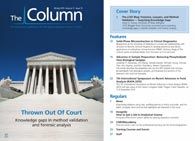How to Get a Job in Analytical Science
How to Get a Job in Analytical Science
Incognito offers some careers advice to aspiring separation scientists.
Photo Credit: fatmayilmaz/Getty Images

I am currently hiring analytical scientists from bench analysts to more senior management - and a lot of the CVs that I’m seeing aren’t really doing it for me at all.
There are certain things I personally like to see on a CV to attract my attention. I want to see your qualifications, who you have worked for previously, and a brief description of your previous job roles. For the more qualified of you, I want to see your publications and presentations; and for the even more senior your management experience and so on.
I also want to to see what sets you apart from the rest. This generally involves situations in which you solved a problem, took an alternative approach, gained valuable experience, or showed a willingness to further understand your work. These needn’t be long-winded stories but some illustrative examples from past CVs include:
- I can maintain and repair high performance liquid chromatography (HPLC) equipment to the point where I know when to call an engineer without costing you money.
- My personal “right first time” metric on gas chromatography–mass spectrometry (GC–MS) is 92% and I have a spreadsheet to prove it!
- I act as an adjudicator in the company method transfer resolution panel and can spot when someone is lying or covering up.
- I know enough to clean a source but not enough to understand why it works - and I’m looking to change this as quickly as possible.
- I am a GC method developer. Not an “onâpaper” method developer which, when you start to question my approach, you will find out I know very little, but one who can develop robust and fit for purpose methods that can actually be used to support your business.
- I have a solid background in analytical chemistry, which at a basic level means I can pour anything into pretty much anything without spilling something. I know how annoying it is to leave a balance in a dirty condition, and therefore I don’t and I can make HPLC and MS equipment sing and dance like Fred Astaire (look him up if you are too young to remember who he is)!
- I can examine a method SOP and tell you where I think the issues might be. I can then confirm that I was right by implementing that terrible method; I can also make it better if that’s what you’d like.
- I won’t be the guy that bothers you with questions on why a method doesn’t work; I’ll be the guy who comes to tell you why the method doesn’t work.
- I drove an improvement scheme, which reduced our department overheads by one-third last year by remodelling our instrument ultilization. Sorry - I should have said I actually introduced a system, which worked better than a spreadsheet designed by an accountant.
I don’t have the means to check these out without actually meeting the person and discussing their claims - oh wait a minute, that’s an interview, right? Am I saying quirky statements get you an interview - well, yes, I guess I am. Even if it’s so I can bust your claims wide open!
I like to hear what you do in your spare time; however, spending time with your family, doing sports, reading, or outdoor activities are a little passé. I’d like to hear the quirky things about you. Again here are some example that have caught my attention:
- (While I was working for an International Coatings company) I have a vested interest in the quality of decorative coatings, as my Father is an interior decorator.
- I like to prove mathematical formulae (that was the only thing written in the box headed “Tell us about Yourself”).
- In my spare time I’m a cat trainer for a wellâknown local street theatre group (domestic feline - not large and scary).
- I’m an end-of-life companion with my local hospice team.
- I design and build machines for automation around the home (please stop thinking of Wallace and Gromit!)
- I’m an international pool champion.
- I’m an ex-professional footballer.
- Working in an analytical laboratory is merely my first step on the career ladder to becoming an international scientific superâgenius.
Again, I’m not saying you should lie or mislead anyone because this will not do your job prospects any good, but something a little out of the ordinary always catches the eye.
Now let us take a second to consider the recruitment programme from my side. How on earth do I assess if you have what it takes from a short interview? Obviously I can ask you a bunch of questions that get progressively more difficult until I reduce you to a quivering wreck, but I’m not sure if this works well. I asked one candidate a while ago why they were laughing after I asked a tricky question - “I feel my sense of humour is all I have left” came the reply.
I can also give you a questionnaire to complete, which helps reduce the nervousness of the interview situation. However, I’ve seen some really dumb questions in these tests and, unless very carefully designed, they can be almost meaningless. Here are just a few illustrative examples:
- Which process is considered as an important approach in the field of analytical science?
- What are the various functions of the process of spectroscopy?
- What are the modes of quantification in related substances tests?
- What is the difference between the silica used for TLC and that used for HPLC?
- What is a baseline?
Presentations can also be difficult. I have a friend who prepared a talk entitled “The Role of Serendipity in Analytical Method Development” for a job interview; in introducing the ethos of the laboratory, the manager explained in some detail the rigorous nature of the method development process and how “automated” and decision tree driven their approach was. It’s always very difficult for a candidate to pitch the perfect presentation and is very time consuming for both parties.
My favourite (and I think most informative) interview task is to take someone into the laboratory and get them to make up an HPLC eluent and adjust the pH with the commensurate recording of data. If it’s a GC job then we make up some standard solutions. Of course I ask questions as I go and we will discuss various aspects of the analytical techniques but these simple operations can reveal much about a person. I do this no matter what level in the company the person will be working - even if their role is laboratory management and they will ostensibly be office based.
So - what’s the take home?
- Be quirky but in the right measure - it helps to differentiate your CV.
- Only write statements that you can back up with knowledge, facts, or skills.
- Be prepared to undertake practical work.
- Most important of all - look like you really want to work in analytical chemistry and not just be another pair of hands that is being thrown in to provide resources. I know this is cynical but I see it so often these days.
- And lastly, have the ambition to become an international scientific super-genius. It got our friend a plum job within the organization I was working for at the time. Don’t knock it until you’ve tried it!
Contact author: Incognito
E-mail: admin@chromatographyonline.com

A Final Word from Incognito—The Past, Present, and Future of Chromatography
February 10th 2022After 14 years in print, Incognito’s last article takes a look at what has changed over a career in chromatography, but it predominantly focuses on what the future might hold in terms of theory, technology, and working practices.
Sweating the Small Stuff—Are You Sure You Are Using Your Pipette Properly?
October 7th 2021Most analytical chemists believe their pipetting technique is infallible, but few of us are actually following all of the recommendations within the relevant guidance. Incognito investigates good pipetting practice and busts some of the urban myths behind what is probably the most widely used analytical tool.





